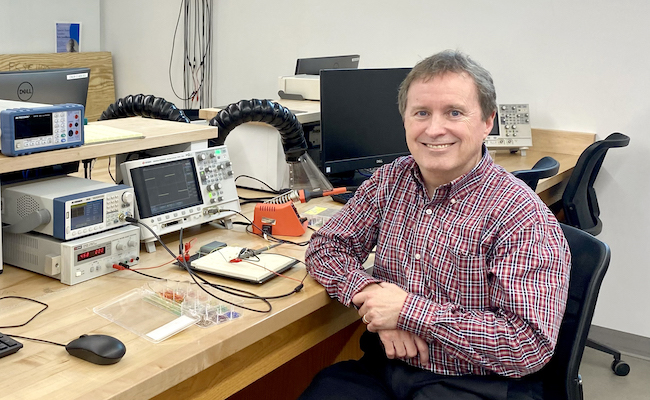
Chris Herring
“Most of my teaching is to guide students to the point where they are okay with trying, struggling, and experiencing what it is like to find the path to a solution rather than being given the map ahead of time.” -Dr. Chris Herring, Lecturer in Electrical and Computer Engineering
Dr. Chris Herring is a Lecturer in the School of Electrical and Computer Engineering. This April 2023, Dr. Herring received the 2023 Creative Teaching Award for his innovative approach to teaching Computer Architecture. In the course, Dr. Herring acts as the project manager, and students are assigned to design teams where they participate in “mini-internships.” Design team members collaborate to come up with solutions and complete projects. Students are encouraged to take on multiple roles where they apply previous knowledge. The course is structured to build upon prior class assignments, discover and correct errors, and create novel enhancements. The class gives students a deeper understanding of concepts while at the same time trying out what their future careers may feel like.
Dr. Herring is a native of Georgia, and we interviewed him to learn what brought him to UGA. Read more below.
Hometown:
Watkinsville, GA
What did you study in college and where did you earn your degrees?
Electrical Engineering, Ga Tech for Bachelor’s and Master’s. UGA for PhD in Engineering.
What brought you to UGA?
The Athens area is my home and my wife’s home. It’s where we grew up.
What are your research interests and what motivated you to pursue this area of study?
My “research lab” is the classroom. My interests are concerned with bringing real world experiences into the classroom. These methods require mixing theory with projects that apply the theory, ideally in a group setting. My motivation is based on personal experiences both from my family and industry.
How long have you been an instructor in engineering and what inspires you to teach or do research in your field?
Since Fall 2018. I want to bring my industry knowledge to the classroom and challenge students to challenge themselves to see what they can accomplish.
What research accomplishment are you most proud of and why?
I’ve brought two new 4xxx level classes to the ECE curriculum and I’m working on more. These classes are structured to offer an “industry like design experience” as much as possible within the class environment. I’ve also helped reimagine ECSE 2920 into a collaborative design project class. I’ve received some recognition for these accomplishments, and I’m honored for that, but my primary goal and motivation is to provide meaningful experiences to students that they will remember and that they will use as experiential examples as they move on from UGA.
What skills do you think are most important for students to succeed in engineering and what methods do you use to ensure the students you engage with learn the skills they need?
It is okay to fail. In fact, learning requires not getting it right the first time or all the time. Paraphrasing Voltaire, students often let “perfection be the enemy of good.” Most of my teaching is to guide students to the point where they are okay with trying, struggling, and experiencing what it is like to find the path to a solution rather than being given the map ahead of time. Once a student is okay with not getting it right the first time, they have the freedom to explore solutions and choose what is optimal for the problem rather than being so concerned about perceptions of failure. This is the first step to succeeding in engineering.
What and/or who encouraged you to become a professor in engineering?
My encouragement comes from my wonderful wife, Rhonda.
What other professional experience do you have?
Most of my professional experience is outside of the University. I have over twenty years’ experience with various companies as a CPU designer, architect, or manager of design teams. My last job in “high tech” was with Advanced Micro Devices where I was responsible for strategic architecture.
How does engineering make the world a better place?
Engineering takes theory and applies it. Think of a world that knows all about the theory of fluid dynamics, statics, and electricity but where there are no engineers to develop air conditioning, bridges, motors, engines, computers, the internet, … I would not want to live in that world.
What excites you the most about engineering?
There’s always something new to learn. I love puzzles and challenges. I consider engineering an occupation that allows me to do something I love every day.
What do you like to do in your pastime / hobbies?
Games of all types. I’ll play board games, video games, simulation, whatever you like. I also like discussing games with students. I like target shooting. I also like travel that is related to history.


